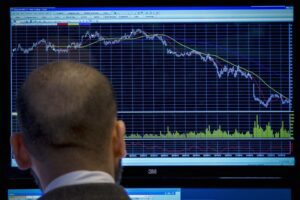
Ghana intends to implement new logistics projects to increase and make more predictable the exports of agricultural products from Ukraine, a similar intention previously announced by Nigeria and Senegal.
According to the website of the Ministry of Agrarian Policy and Food of Ukraine on Friday, the deepening of cooperation in agriculture and trade relations was discussed by Ukrainian Minister of Agrarian Policy Nikolay Solsky and Ghanaian Minister of Food and Agriculture Owusa Afriy Akoto.
It is specified that the parties considered the issue of creation of a joint project – a logistics hub for food storage, which will allow to store high-quality grain, promote the predictability of sales and stabilization of world food prices.
The Ministry of Agrarian Policy recalled that the Republic of Ghana was the third country visited by a delegation of the Ministry of Agrarian Policy during its official visit to African countries, each of which expressed its desire to create a logistics hub for the export of Ukrainian grain.

Stock indices of most major Asia-Pacific countries are rising on Friday, the exception is the Japanese market.
Japan’s Nikkei 225 index was down 1.2% by 7:32 am KC.
One of the reasons was the 7.4% drop of Fast Retailing stocks. A day earlier Asia’s largest apparel retailer, which owns the Uniqlo brand, released its September-November reporting, which failed to meet analysts’ expectations.
Fast Retailing increased its revenue in the first quarter by 14%, but it was below the forecasts. At the same time, net income fell 9 percent, mainly due to weak performance in China, where strict quarantine restrictions were in effect.
In addition, shares of automakers Mitsubishi Motors Corp. (-4.3%), Mazda Motor Corp. (-4.2%) and Subaru Corp. (-2.6%) became cheaper on Friday.
Meanwhile, financial sector stocks including Mitsubishi UFJ Financial Group Inc. (+3.5%), Chiba Bank Ltd. (+5.2%), Concordia Financial Group (+6.4%), Fukuoka Financial Group Inc. (+6.4%) rose.
China’s Shanghai Composite was up 0.5 percent by 7:37 a.m. ET, Hong Kong’s Hang Seng gained 0.1 percent.
Shares of game developer Netease Inc. surged 2.9 percent on Hong Kong Stock Exchange, oil producers PetroChina Co. and CNOOC gained 2.9 percent and 1.9 percent, respectively, while Chow Tai Fook Jewellery Group gained 3.1 percent and retailer Alibaba rose 0.6 percent.
China’s foreign trade surplus in 2022 increased by 29.7% to a record $877.6 billion, China’s General Administration of Customs reported on Friday. At the same time, exports increased by 7% and imports increased by 1.1%. The growth rates were lower than in 2021, when they were 29.9% and 30.1%, respectively.
Meanwhile, China’s exports fell 9.9% in December and imports fell 7.5%. The decline in both indicators was recorded for the third month in a row.
The value of South Korea’s Kospi was up 0.85% by 7:32 a.m. ET. The index has been rising for the eighth consecutive trading session and is at its highest level in the past month.
Stocks of one of the world’s biggest chip and electronics makers Samsung Electronics Co. rose 0.7%, automaker Hyundai Motor rose 1.5% and steelmaker Posco gained 4.6%.
Australian S&P/ASX 200 index added 0.7% over the day.
Shares of the world’s largest mining companies BHP and Rio Tinto gained 0.5% and 0.9% respectively.
The value of the country’s leading wine producer Treasury Wine Estates Ltd. rose 2.1%.

The U.S. dollar is getting stronger against the euro and the pound sterling after declining in the previous session, but it keeps getting cheaper in pair with the yen.
The ICE index showing the dollar’s movement against six currencies (euro, Swiss franc, yen, Canadian dollar, pound and Swedish krone) is gaining 0.16%, while the broader WSJ Dollar Index is 0.12%.
The ICE dollar index fell sharply Thursday after the release of U.S. inflation data, near its lowest level in seven months.
U.S. consumer prices (CPI) rose 6.5% in December compared to the same month last year, the nation’s Labor Department said Thursday. Thus, inflation slowed from 7.1% in November to its lowest level since October 2021. Consumer prices fell 0.1% from the previous month, the first month-over-month decline since 2020.
Traders believe the Federal Reserve (Fed) may slow the pace of prime rate hikes to 25 basis points at its next meeting due to slowing inflation, Trading Economics noted.
The euro/dollar pair is trading at $1.0840 as of 8:00 a.m., up from $1.0854 at the close of the previous session. The pound/dollar exchange rate dipped to $1.2182 during trading on Friday from $1.2212 the day before.
On Thursday, the dollar depreciated by 0.9% against the euro and by 0.5% against the pound.
The value of the American currency in pair with the yen continued to decline on Friday after a 2% decline the day before.
The exchange rate of the dollar fell to 129.19 yen during the trading session, compared to 129.3 yen at the close of the previous one.
JPY was supported by the report of the Japanese newspaper Yomiuri Shimbun that the leaders of the Bank of Japan plan to discuss the unintended consequences of their approach to the monetary-credit policy at the meeting that will be held on January 17-18.
According to the newspaper, the Japanese Central Bank will consider adjustments to monetary policy, including by changing the conditions of the bond purchase program to “reduce its negative impact.
Experts interrogated by Bloomberg expect that the Japanese Central Bank will pass to toughening of monetary policy earlier than it was supposed before.
Almost all respondents of the agency forecast that the Bank of Japan won’t change the main parameters of its policy next week. At the same time 38% of respondents expect its adjustment either in April or in June.

Oil prices are down on Friday, but finished the week with a strong increase due to signals of increased demand in China.
Chinese authorities significantly raised oil import quotas for local companies, which suggests that refineries are about to increase production.
Investor optimism about the prospects for the U.S. economy provides additional support to the market, notes Bloomberg. Statistics data published the day before showed a slowdown in inflation in the U.S., which reinforced expectations of an imminent end to the cycle of base interest rate increases in the country.
The cost of March futures for Brent crude oil on London’s ICE Futures exchange was $83.67 a barrel by 7:15 a.m. on Friday, down $0.36 (0.43%) from the previous session’s closing price. Those contracts rose $1.36 (1.7%) to $84.03 a barrel at the close of trading on Thursday.
The price of WTI futures for February crude oil at electronic trades of NYMEX fell by $0.22 (0.28%) by that time to $78.17 per barrel. By closing of previous trades these contracts grew by $0.98 (1.3%) to $78.39 per barrel.
U.S. consumer prices (CPI) rose 6.5% in December from a year earlier, the Labor Department said Thursday. Thus, inflation slowed from 7.1% in November, the lowest since October 2021. Consumer prices fell 0.1% from the previous month, the first month-over-month decline since 2020.
“The inflation data show that the Fed is probably almost done with the rate hike and the U.S. economy will be able to avoid a recession,” notes OANDA chief analyst Edward Moya, quoted by Market Watch.

Albania intends to open an embassy in Ukraine – for the first time during the period of diplomatic relations between the countries, Albanian Foreign Minister Olta Djacka said on the occasion of the 30th anniversary of diplomatic relations between the countries.
“Albania and Ukraine are part of the family of free democratic nations, the future of both is in the Euro-Atlantic family. On the occasion of the 30th anniversary (of diplomatic relations – IF-U) I am pleased to announce that Albania will expand its diplomatic presence in Kiev by opening an embassy in Ukraine,” she wrote on Twitter.
The foreign minister added that Ukraine’s heroic resistance is a fight for freedom and a rejection of a return to the tyranny from which both states emerged.
“That is why Albania will support Ukraine and its people as best it can until they are defeated in the illegal war of aggression by the Russian Federation,” Olta Djacka explained.
The minister stressed that she looks forward to working closely with her Ukrainian counterpart Dmitry Kuleba to further develop and strengthen cooperation in the future.

The Verkhovna Rada of Ukraine adopted as a basis the “agricultural” bill #8166-d, which introduces the regime of export security and regulation of the balance of payments of Ukraine for exports of agricultural products during martial law, which allows to ensure the full and timely receipt of foreign currency proceeds.
MP Yaroslav Zheleznyak (Golos faction) said in a Telegram channel that draft law No. 8166-d “On Amendments to the Customs Code of Ukraine and other laws of Ukraine on the introduction of special export procedures during martial law, state of emergency” was adopted as a whole at Thursday’s meeting by 231 votes (with the minimum required 226).
According to the explanatory note to the document, the bill allows the export of goods subject to the export security regime exclusively to legal entities – value added tax payers, whose registration is not suspended. In addition, in order to export goods for which the export security regime is applied, they will need to have a positive history in terms of the return of foreign currency proceeds for the previous six months and the absence of violations of currency legislation.
It is specified that if the exporter does not have a positive history or if its volume of export transactions considerably exceeds the previous six months, a legal entity must register the relevant tax invoices in the Unified Register of tax invoices.
“In such case the exporter will receive the right for budget refund for operations on export of goods outside the customs territory of Ukraine, in relation to which the export security regime is applied, only if the bank of Ukraine, which services such taxpayer, completes currency supervision over the resident’s compliance with the deadline for settlements of the respective operation on export of goods,” the explanatory note to the document specifies.
According to the author of the bill, such measures are caused by a significant debt of non-residents to the Ukrainian subjects of foreign economic activity, which amounted to $7.37 billion as of January 1, 2022, of which $5.08 billion was owed on export operations. At that, during nine months of 2022, the debt increased to $7.62 billion, and the debt on export operations increased to $5.45 billion.
“The adoption of the bill will facilitate the receipt of foreign currency proceeds and will prevent unjustified capital flight from the state by creating safeguards to reduce the cases of purchase of agricultural products for cash and the subsequent export of these products without the return of foreign currency proceeds from such transactions in Ukraine,” the explanatory note to the bill states.
Earlier, the Ministry of Agrarian Policy and Food of Ukraine specified that the draft law No. 81660-d agreed with the agrarian sector was proposed instead of the draft law No. 8166 the provisions of which were strongly criticized by agricultural associations. The amended document allows farmers to use the tax credit as collateral for the return of foreign exchange earnings and not to use working capital, as it was stipulated in the basic version of the bill.
According to the ministry, the document allows legal agribusiness to export agricultural products without any additional regulation within the established limit. The monthly amount of this export limit is calculated as double the amount of the average monthly volume of foreign exchange earnings returned by a legal entity, calculated for the previous six months. Within the limit, exports can be made according to the current procedure, without any additional legislative regulation.
In the event that the company’s export needs exceed the calculated limit, a tax invoice at the rate of 14% must be registered for this overtime amount. After the foreign currency proceeds are returned, it is possible to adjust such an invoice at the tax rate from 14% to 0% and receive a VAT refund on it.
“In fact, this makes it possible to use a tax credit as collateral for the return of foreign currency proceeds, and not just cash in hand, as it was envisaged in the basic version of the bill,” the Ministry of Agrarian Policy emphasized in the message.